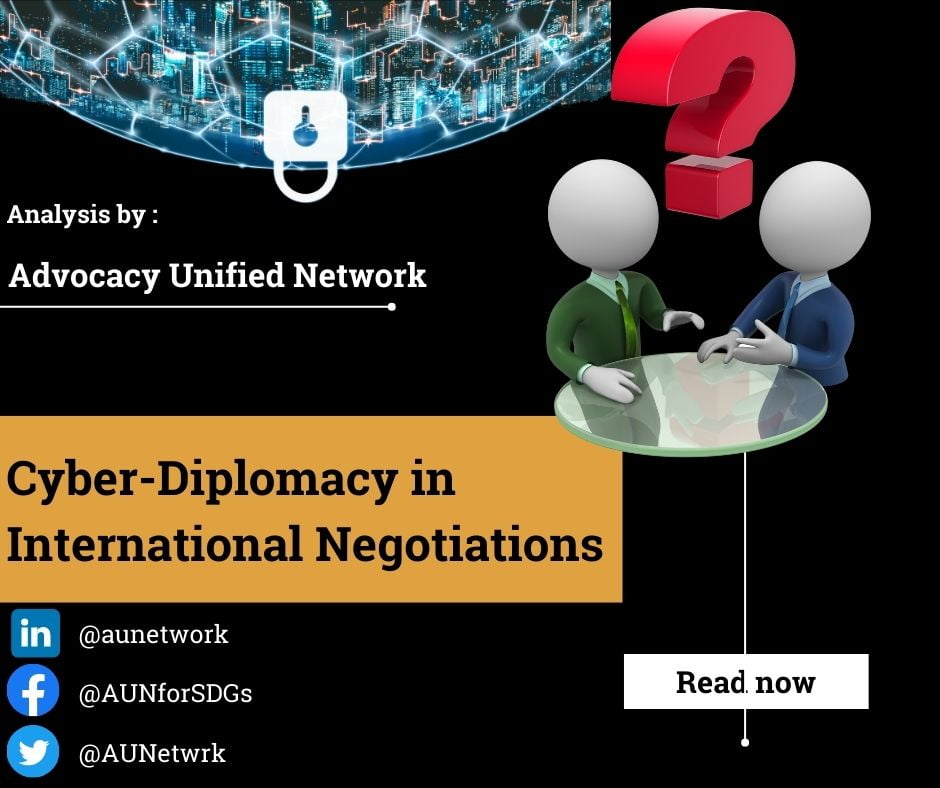ABSTRACT
Through careful research of its intricate structures and dynamic mechanisms, this study seeks to thoroughly understand the topic’s substantial impact on governance, security, and the global environment. The idea of the “deep state map,” which refers to an unofficial network that controls political affairs and acts outside the purview of conventional institutions, has drawn considerable attention and spurred debate in several different fields. This study seeks to understand the deep state map idea by evaluating case studies and actual data. The current study intends to analyse the complex interactions between the deep state and state conduct and how these interactions affect decision-making processes, foreign policy formation, and regional power dynamics. The current work emphasises the importance of in-depth analysis and abiding by scholarly standards to improve our understanding of the deep state map. This practice encourages openness, makes it possible to design informed policies, and improves our comprehension of the intricate dynamics of modern society.
I. Introduction
The notion of the deep state has garnered significant attention and interest among the general populace, prompting a surge in scholarly inquiry and conjecture. The present study explores the enigmatic phenomenon of the deep state map and its extensive ramifications for global politics. The present study attempts to elucidate the elusive phenomenon under consideration by scrutinising its complex structures and dynamic mechanisms, with the ultimate objective of attaining a holistic comprehension of its far-reaching impact on governance, security, and the global milieu.
Consider an underground network functioning in obscurity, wielding sway and moulding the trajectory of governmental matters outside the scope of official establishments. The deep state is a concept that has garnered significant attention from scholars, journalists, and conspiracy theorists alike due to its elusive and often controversial nature. The term “deep state” is multifaceted, and its precise meaning may be contingent upon the particular context in which it is employed. Fundamentally, however, it denotes a complex web of actors, organisations, and entrenched interests that exert considerable influence and function beyond the confines of democratic oversight.
Multifaceted Network of Deep State Map
Upon delving into the notion of the deep state, one is confronted with a multifaceted network of interrelationships and covert mechanisms. The enigmatic character of the deep state is rooted in its capacity to surpass conventional power hierarchies, functioning in tandem with formal state institutions and exerting a discernible impact on policy-making mechanisms through understated yet consequential means. The perplexing nature of the subject matter has instigated debates and piqued curiosity, thereby necessitating a rigorous investigation of its underlying mechanisms and ramifications.
In order to comprehend the ramifications of the deep state in the realm of international relations, it is imperative to undertake a comprehensive exploration of its intricate interplay with state conduct and the broader geopolitical terrain. Through a comprehensive analysis of its impact on decision-making mechanisms, foreign policy articulation, and regional power configurations, one can gain a deeper understanding of its far-reaching implications on the international arena. The present study endeavours to elucidate the influence of the deep state on global collaboration, diplomacy, and the intricate equilibrium of authority among states through the analysis of case studies and qualitative data.
A research paper with steadfast dedication
This research paper is characterised by a steadfast dedication to delivering comprehensive analysis and integrating pertinent references to substantiate our claims. Through this approach, the integrity and scholarly rigour that is demanded in academic research are upheld. Through a rigorous analysis of the deep state and its impact on global affairs, we aim to enhance comprehension of this elusive phenomenon and its extensive ramifications.
As we traverse the complex maze of the deep state, we must maintain a steadfast commitment to avoiding the temptation of unsubstantiated conjecture and refrain from becoming engulfed in a vast expanse of hypothetical musings. The present study endeavours to approach the subject matter from an unbiased perspective, aiming to unravel the intricacies of a multifaceted and intriguing phenomenon. The ultimate objective is to derive significant inferences that can contribute to the development of policies, augment transparency, and foster a more nuanced comprehension of the contemporary world.
II. Understanding the Deep State Map
Consider a hypothetical concealed domain situated within the innermost sanctums of authority, wherein prominent personalities clandestinely manoeuvre, moulding regulations and verdicts beyond the purview of the masses. The term “deep state” has garnered significant attention and interest in contemporary times, serving as a subject of intense curiosity and speculation within the public sphere. This research endeavour aims to undertake an extensive investigation into the complex network of the deep state, with a focus on comprehending its internal mechanisms and analysing its potential impact on the international arena.
The deep state is not a homogenous entity but rather a multifaceted network of individuals, frequently affiliating to governmental establishments, who possess significant power and sway. The exertion of authority by specific individuals, owing to their positions in intelligence agencies, the military, or other influential organisations, over policy-making processes is a well-established phenomenon. Such individuals are known to operate beyond the purview of elected officials. The outcome manifests as a parallel structure that challenges the conventional understanding of democratic governance.
A significant challenge in the quantification and measurement of Deep State Map

In order to gain a comprehensive understanding of the deep state concept, it is imperative to navigate a complex and enigmatic terrain. The topic under consideration poses a significant challenge in quantification and measurement, rendering it a subject of intense deliberation and conjecture. By synthesising qualitative data from case studies and applying theoretical frameworks, it is possible to initiate a process of unravelling the complex fabric of the deep state.
The ramifications of the deep state transcend the territorial confines of discrete nation-states. The actions and decisions of a particular entity possess the capacity to mould domestic policies, exert influence on international relations, and potentially affect the distribution of power among nations. Comprehending the intricacies of global affairs necessitates a comprehensive understanding of the operational mechanisms employed by the deep state.
Delving deep into diverse ramifications
Our scholarly pursuit is focused on comprehensively comprehending the phenomenon known as the deep state. The provision of comprehensive analysis, substantiated by references and illustrations, is imperative for upholding the credibility and scholarly rigour requisite in research papers. Through this endeavour, we aim to illuminate the diverse ramifications of the deep state on governance, diplomacy, and safeguarding democratic principles.
In summation, our scholarly pursuit of comprehending the intricacies of the deep state reveals a complex network of authority, confidentiality, and sway. By means of analysing case studies and theoretical frameworks, our objective is to elucidate the perplexing nature of the deep state and its ramifications for international affairs. Through such endeavours, we make significant contributions towards advancing our comprehension of the obstacles encountered by democratic systems and offer valuable perspectives on navigating the intricacies of contemporary society effectively.
III. Mapping the Deep State
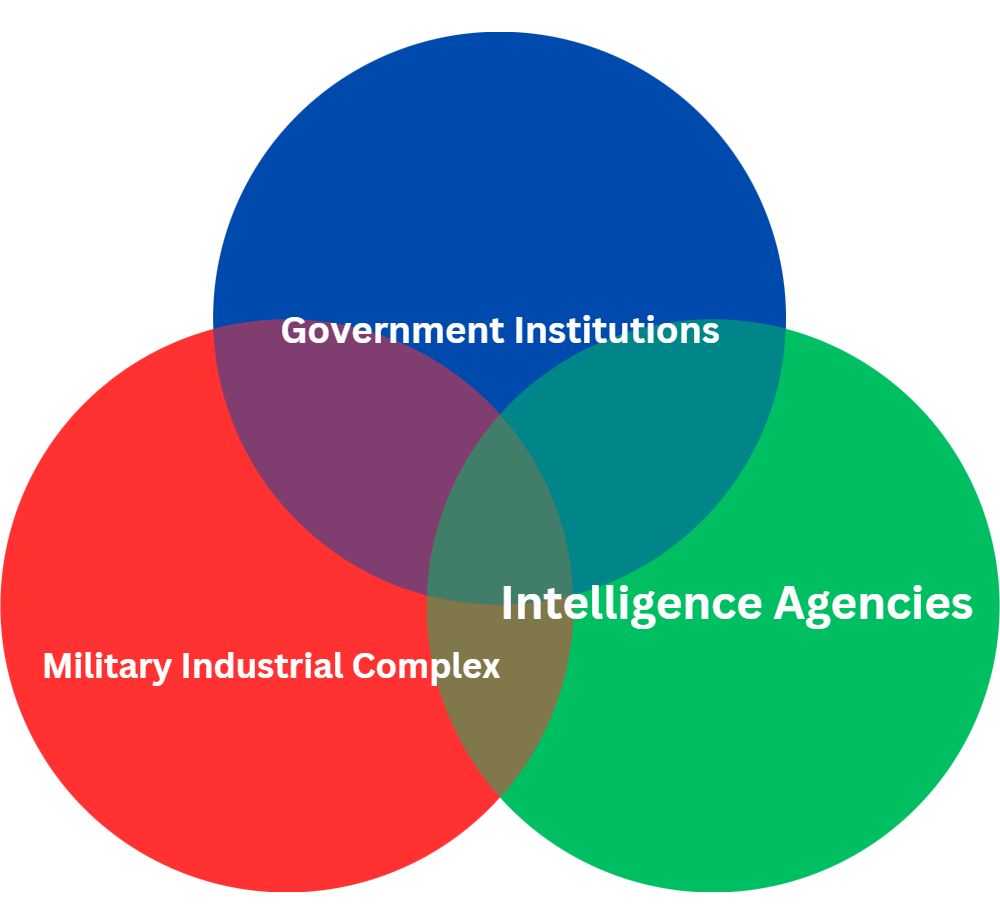
The “deep state” concept has become a fascinating area of study and heated debate due to its potential to inspire both. The present study, “Unveiling the Deep State Map: Analysing its Implications for International Relations,” thoroughly investigates this elusive phenomenon—our research endeavours to comprehensively chart the Deep State by applying meticulous analytical frameworks and methodologies. Our objective is to unravel the intricate networks, complex structures, and influence mechanisms underpinning this phenomenon. The present study aims to elucidate the complicated mechanisms of the Deep State and their ramifications for the domain of global politics.
The Deep State can be conceptualised as a complex and extensive network that operates covertly within the societal framework, exerting its influence and moulding the trajectory of political affairs beyond the purview of public scrutiny. Despite its seemingly conspiratorial nature, the Deep State is a complex system of individuals, institutions, and vested interests that function in tandem with formal government structures. This force’s latent influence can significantly affect the cognitive processes involved in decision-making, the development of policies, and the fundamental underpinnings of governance.
Rigorous Investigation of Deep State Map
Comprehending the Deep State necessitates delving into the obscure and disentangling its intricacy. The above notion evokes bewilderment and curiosity, further compelling us to explore authority and sway’s obscure intricacies. By means of rigorous investigation and thorough examination, we aim to elucidate this complex phenomenon and offer a more comprehensive comprehension of its mechanisms and ramifications.
In order to comprehend the gravity of the Deep State phenomenon within the domain of international relations, it is imperative to acknowledge its potential ramifications on domestic governance, global institutional frameworks, and diplomatic ties. Through a meticulous analysis of the complex interplay between various actors, covert activities, and opaque power structures, our research endeavours to elucidate the mechanisms by which the Deep State exerts its sway over global politics. The present study investigates the implications of the Deep State’s presence and functioning within the framework.
Yearning to unearth veracity
As we traverse this complex terrain, our unwavering dedication lies in furnishing comprehensive scrutiny and buttressing our contentions with pertinent citations. The references cited in a research work serve as crucial signposts that aid in navigating the complex maze of information and bestow authenticity on the research endeavour. Integrating scholarly sources is imperative to uphold the rigour and integrity of our investigation into the Deep State.
The quest for comprehending the Deep State is propelled by the yearning to unearth veracity and illuminate the covert influences that mould our global milieu. By conducting a nuanced analysis of the impact and implications of the Deep State, we aim to make a valuable contribution to the scholarly understanding of the intricate power dynamics beyond conventional governance’s purview. The present study endeavours to augment transparency, enrich policy deliberations, and cultivate a more holistic comprehension of our worldwide milieu.
IV. Implications of the Deep State Map for International Relations
Consider a covert network that operates secretly in the background, exerting a subtle yet significant impact on the trajectory of governmental decisions and policies, frequently without the knowledge of the broader populace. The deep state is a multifaceted and elusive phenomenon that has garnered the interest of academics and individuals who subscribe to conspiracy theories. In the domain of international relations, comprehending the deep state concept is of paramount importance as it holds the capacity to influence the intricacies of diplomacy, foreign policy, and worldwide governance.
The deep state concept can be analogised to cryptic cartography, wherein convoluted passageways and surreptitious agents traverse its intricate topography. The assemblage in question comprises individuals who hold significant sway and exert considerable influence over the state’s administrative apparatus, including but not limited to prominent bureaucrats and military personnel. The covert agents in question operate beyond the scope of established organisations, frequently functioning in obscurity but exerting a significant influence on the trajectory and consequences of global affairs.
Exploring the complex networks
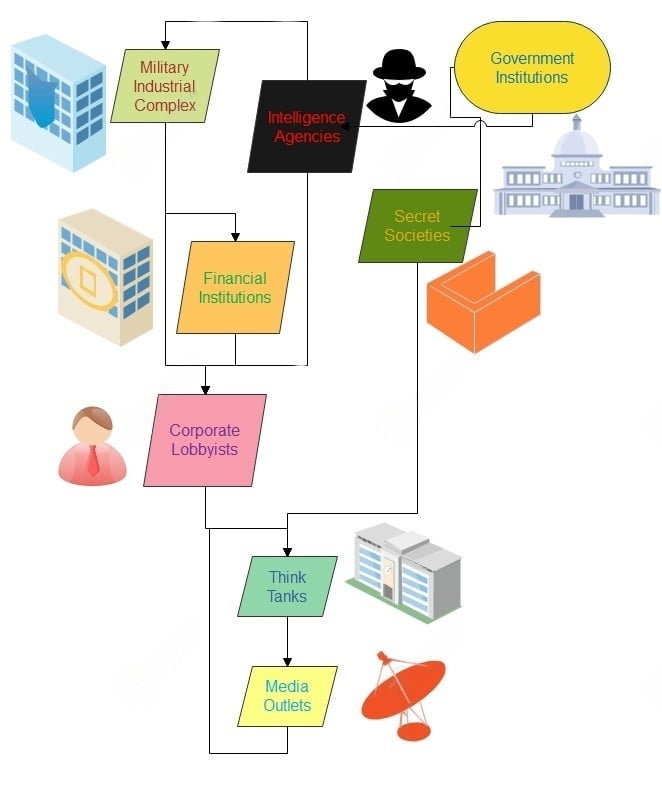
To comprehend the deep state concept, one must meticulously examine the veiled aspects of worldwide politics and unravel the layers of confidentiality that shroud it. The subject matter at hand elicits inquiries of a foundational nature regarding the equilibrium of authority, the essence of administration, and the function of democratic principles within the global sphere. Through a comprehensive analysis of the influence of the deep state, it is possible to reveal its potential impact on various aspects of international relations, including cooperation, conflict resolution, and the overall balance of power among nations.
Investigating the deep state necessitates adept navigation of the intricacies inherent in its organisational frameworks and functional modalities. It is imperative to comprehensively analyse obscured networks, clandestine partnerships, and the underlying mechanisms that substantiate their influence. Through thoroughly exploring these complex networks, it is possible to gain insight into the mechanisms by which the deep state exerts its influence on the formulation of policies, the direction of foreign affairs, and the equilibrium of power dynamics between nations.
Unearthing the concealed veracities
The present study aims to offer an in-depth analysis of the topic under investigation, relying on reliable sources and references to substantiate our claims. Our steadfast dedication to meticulous research and analysis based on empirical evidence is a testament to our endeavours’ scholarly integrity and credibility. Our research endeavours to offer a nuanced comprehension of the deep state and its ramifications for international relations. We aim to contribute to the ongoing discourse that surpasses mere conjecture and delves into the intricate complexities of global politics.
As we commence this scholarly expedition, let us not be intimidated by the intricate and enigmatic characteristics of the covert government apparatus. Let us be motivated by an innate inquisitiveness and an ardent yearning to unearth the concealed veracities that mould our universe. Through a comprehensive analysis of the deep state map, our research endeavours to elucidate its ramifications for international relations, aiming to cultivate a more sophisticated and discerning comprehension of the intricate mechanisms that mould our global terrain.
V. Unveiling Deep State Networks
Comprehending the concept of the Deep State entails traversing a complex maze of intricate machinations, authoritative dominance, and covert persuasions. The notion has engrossed the intellectual community, media personnel, and the general populace, inciting spirited discussions and conjectures. The inquiry pertains to the precise nature of the subject matter under consideration. The term “Deep State” refers to clandestine networks operating within the confines of governmental institutions, functioning in parallel with official channels and exerting substantial sway over pivotal decision-making processes.
Consider a hypothetical domain characterised by obscure affiliations, covert manoeuvres, and converging vested concerns. The present domain under consideration pertains to the Deep State, a multifaceted network that frequently functions surreptitiously, exercising influence and manoeuvring the trajectory of administration. The abovementioned notion presents a paradigm shift that contests the conventional comprehension of established establishments and uncovers an alternative realm where covert influences dictate the trajectory of states.
Inter-sectoral functions
In order to comprehend the enigmatic and intricate nature of the Deep State, we must adopt a genuine sense of curiosity and endeavour to unravel its complexities. The process is reminiscent of delving into a complex enigma, wherein every fragment divulges fresh strata of comprehension. The Deep State can be understood as a complex network of interrelated actors, institutions, and interests rather than a homogenous entity. The phenomenon in question transcends geopolitical boundaries and functions inter-sectorally, involving entities such as intelligence bureaus, armed forces, corporate magnates, and prominent personalities.
For that purpose, we set out to investigate the far-reaching effects of the Deep State on international relations. Examining its prevalence in the regions of the Global South provides significant contributions to understanding its effects on the systems of governance and the mechanisms of democracy. The present study delves into the phenomenon of “deep state networks, ” which are deeply entrenched in the social fabric of various countries, including Brazil and the Democratic Republic of the Congo. The study employs a case study approach to unravel the complex structure of these networks, which have been found to erode the fundamental principles of transparency, accountability, and the rule of law.
Case studies from Global South
Consider the case of the Operation Car Wash scandal in Brazil, a revelation that reverberated throughout the country. The investigation findings unveiled a convoluted web of corrupt practices, bribery, and unlawful undertakings that implicated individuals in positions of authority and influential business community members. The present case study demonstrates the potency of deep state networks that function within intelligence agencies and bureaucratic frameworks, exerting influence over the political terrain and safeguarding established interests.
Our focus now shifts to Africa, namely the Democratic Republic of the Congo under Mobutu Sese Seko. The protracted authoritarian rule of the individual in question was characterised by widespread corruption, favouritism, and a firm hold on authority. By conducting a comprehensive examination of the complex patronage networks and covert financial transactions, our research has uncovered the existence of Deep State forces that have facilitated widespread corruption and impeded the advancement of democratic ideals.
Empirical substantiation
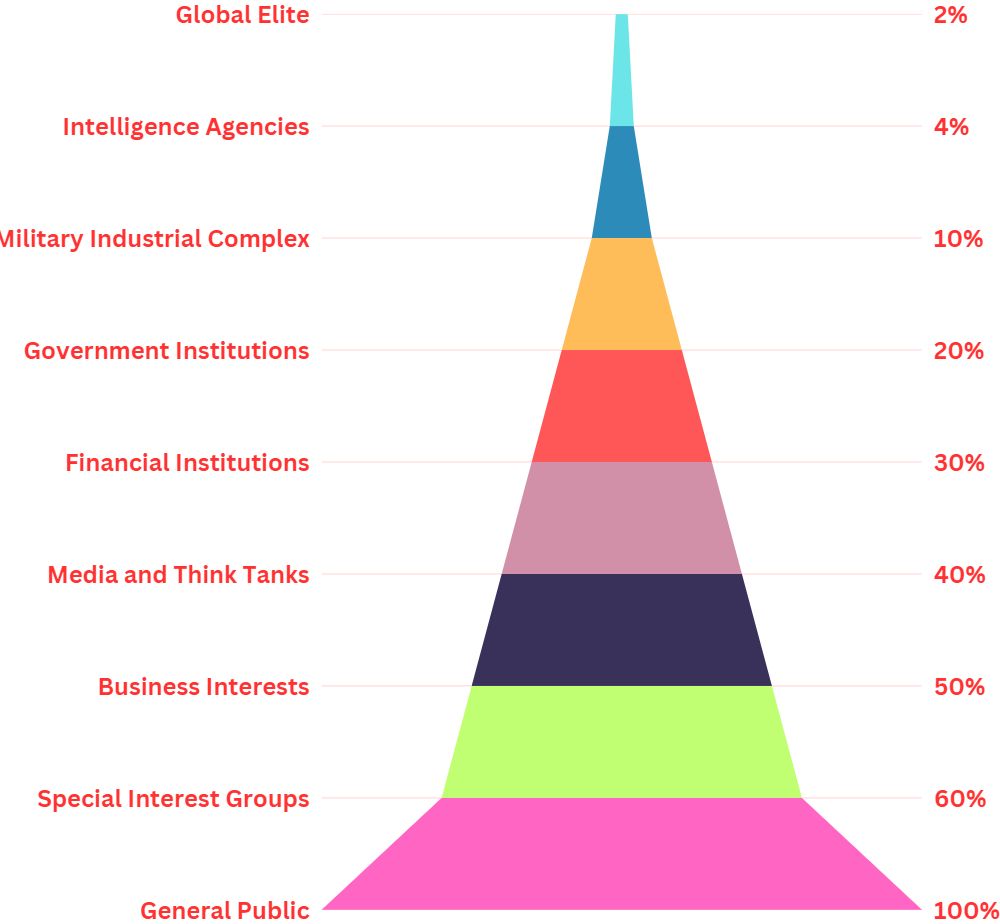
VI. Deep State Map and Security Paradigms
The examination of the impact of the Deep State on security paradigms necessitates a thorough analysis of the intelligence agencies’ sphere. The agencies responsible for ensuring national security have been subject to allegations of undertaking clandestine operations and conducting surveillance measures that circumvent legal frameworks and democratic scrutiny. The perpetuation of such actions not only infringes upon the fundamental rights of individuals to privacy but also engenders apprehensions regarding the potential exploitation of authority within these covert systems.
The domain of military-industrial complexes represents a crucial sphere where the manifestation of the Deep State’s sway becomes evident. The present analysis reveals that the Deep State is intricately linked with the vested interests of defence contractors, lobbyists, and top-tier military personnel, thereby substantially impacting defence policies and procurement determinations. The potential influence in question has the capacity to distort the prioritisation of national security objectives, leading to an unwarranted increase in military expenditure, the perpetuation of ongoing conflicts, and the diversion of resources from critical societal needs.
The Deep State’s Impact on Foreign Policy: Consequences for Stability and Collaboration
The subject of intense debate in scholarly circles pertains to the impact of the Deep State on foreign policy decisions. According to scholarly discourse, there is a contention that covert networks of authority and sway can steer diplomatic tactics, thereby formulating policies that favour particularistic interests at the expense of broader national or global concerns. The ramifications of distorted foreign policy decision-making are extensive, potentially impacting regional stability, international collaboration, and the endeavour to achieve peaceful conflict resolutions.
Our goal in this study paper is to provide a deep dive into the phenomenon of the Deep State and its far-reaching effects on international security and diplomacy. We use rigorous analysis of case studies, historical instances, and theoretical frameworks to elucidate the intricate interplay among clandestine power structures, security paradigms, and global affairs.
The present research endeavour aims to furnish an exhaustive examination of the subject matter, accompanied by a comprehensive citation of pertinent literature, thereby substantiating our claims and upholding the scholarly standards of academic inquiry.
Aiming for impartiality and avoiding the trap of sensationalism or unsubstantiated conspiracy theories is an absolute must as we begin this exploration. We hope our findings will help politicians, academics, and the general public make better decisions to pursue a safer and more transparent world by increasing their awareness of the Deep State phenomenon and its consequences for security paradigms.
VII. Challenges and Responses
The deep state phenomenon presents a multitude of challenges that impede our comprehension and reaction to this clandestine network. One of the foremost challenges pertains to the covert disposition of the deep state entity itself. The entity in question functions surreptitiously, exerting its impact covertly and eluding public inspection. The inherent opacity of the subject matter poses a significant challenge in identifying and comprehending the various actors, mechanisms, and motivations at play. As with a challenging jigsaw puzzle, one must adeptly navigate the intricate and multifaceted components in order to attain a more comprehensive understanding.
The potential conflict between democratic principles and the existence of a deep state presents yet another challenge. The fundamental tenets of transparency, accountability, and the consent of the governed are indispensable pillars of democratic systems. The operational modus operandi of the deep state can potentially subvert the fundamental tenets of governance, thereby giving rise to apprehensions regarding the equitable distribution of authority and the democratic credibility of the actors involved. The statement provokes an inquiry into how elected representatives and establishments genuinely wield authority and exercise judgement in the populace’s interest. The dialectical interplay between democratic ideals and the covert operations of the deep state necessitates meticulous examination and contemplation.
Understanding the Global Deep State Map: Implications and Inquiries
Furthermore, the worldwide scope of the deep state presents supplementary complexities. The impact of this phenomenon transcends geographical boundaries and permeates the global sphere. The intricate nature of the deep state phenomenon, which is intricately linked with more comprehensive international affairs, poses a challenge to scholars seeking to investigate and tackle this issue due to its transnational reach. Comprehending the intricate interplay between the deep state and global actors, its impact on diplomatic ties, and its role in shaping geopolitical dynamics assumes paramount significance in understanding its ramifications for international relations. The subject matter necessitates a multidimensional approach that considers the global terrain’s interrelatedness.
In order to aptly address these challenges, scholars, researchers, and policymakers must embrace pioneering methodologies and approaches. The conduct of comprehensive case studies provides significant insights into past occurrences of deep state influence, thereby illuminating its modus operandi and ramifications. Examining the functions of intelligence agencies and their interplay with the deep state presents additional avenues for scholarly inquiry. Cross-contextual comparative studies can provide valuable insights and facilitate the identification of shared patterns or divergences.
Furthermore, it is crucial to scrutinise the intricate interdependence of the deep state and democratic establishments. The crux of this inquiry pertains to comprehending the modus operandi of the deep state, the channels through which it exerts its sway, and the plausible susceptibilities inherent in democratic frameworks that facilitate its sustenance. The present analysis holds the potential to enlighten endeavours aimed at enhancing transparency, accountability, and democratic safeguards, thereby ensuring that the power dynamics align with democratic tenets.
VIII. The Deep State Map in the Digital Age
In the digital era’s dynamic and constantly changing realm, the Deep State is observed to be adjusting and leveraging technological advancements to enhance its impact. The present study investigates the intricate interplay between the deep state and the digital domain, scrutinising how technological advances have restructured power dynamics and surveillance methodologies. We hope to make sense of the complex interplay between government, international relations, and the ever-evolving digital landscape by exploring the Deep State’s digital-age ramifications.
The dawn of the digital age has heralded a new era of power in which the Deep State can flourish. A notable manifestation of this phenomenon is the proliferation of surveillance technologies and intelligence agencies’ extensive acquisition of personal data. Concerns regarding privacy and power abuse have come to the fore in today’s era of widespread digital communication. The capacity of the Deep State to surveil and obtain extensive quantities of personal information gives rise to significant inquiries concerning the intricate equilibrium between safeguarding national security and preserving individual civil liberties.
Social Media Influence: Deep State’s Exploitation of Digital Platforms”
In addition, the impact of social media platforms on public discourse and political agendas has introduced an additional facet to the Deep State’s capabilities. The platforms in question have garnered significant influence due to their extensive user bases and algorithmic content delivery mechanisms, rendering them potent instruments for shaping narratives and manipulating information. The Cambridge Analytica scandal stands as a poignant illustration of the potential for exploitation, wherein the personal data of millions of Facebook users was harvested for political objectives. The instance mentioned above highlights the complex interplay between the Deep State and the digital sphere, wherein the manipulation of data and the moulding of public sentiment have witnessed a marked upgradation in sophistication.
The study of the implications of the Deep State in the digital age necessitates a comprehensive examination of the dynamic and fluid nature of power, governance, and international relations. The advent of the digital realm has led to a blurring of traditional boundaries, thereby enabling unparalleled connectivity and the dissemination of information. The adeptness of the Deep State in manoeuvring through intricate terrain and exploiting technological resources prompts inquiries regarding the answerability and openness of governmental structures. In light of the evolving power dynamics and the emergence of new actors, it is imperative to comprehend the intricate interplay among the Deep State, technology, and global governance.
Scholarly Rigour and References: Analyzing the Deep State Map in the Digital Age
In order to ensure the scholarly integrity and academic rigour of the present research manuscript, a comprehensive analysis has been conducted, and pertinent references have been incorporated. These citations will back up our claims and give individuals interested in learning more a place to start. We hope that by doing an in-depth analysis of the Deep State in the digital age, we may help readers better grasp the interplay between power, governance, and international relations in the modern world.
To sum up, the Deep State’s foray into the digital sphere is a significant step forward in analysing authoritative behaviour. The Deep State’s influence in the digital age has far-reaching consequences, which must be carefully examined as technology grows and affects our lives. We can better manage this changing terrain, protect individual rights, and promote transparent and accountable governance in the digital age if we can untangle its complexities and appreciate its impact on global dynamics.
IX. Deep State Map and Global Governance
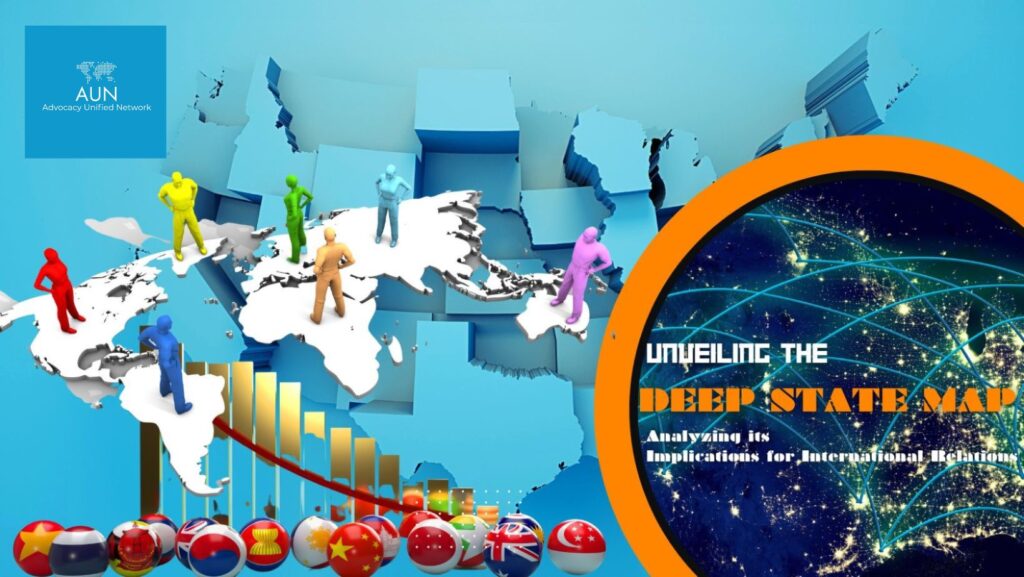
Within the domain of global governance, the notion of the deep state has emerged as a topic of fascination and conjecture. The term pertains to a surreptitious assemblage of prominent personalities who function in the background, exerting authority and sway that transcend the purview of democratic mechanisms. The latent power in question possesses the capacity to exert a substantial influence on the dynamics of international affairs and the efficacy of worldwide regulatory frameworks.
Consider a hypothetical realm existing in the inner sanctums of authority, where determinations are formulated, and strategies are crafted beyond the purview of the general populace. Here lies the purview of the “deep state,” a mysterious organisation with a track record of working covertly to affect policy-making and national security at the highest levels. Its very existence undermines the foundational values of democratic, open, and accountable global governance.
Deep State’s Covert Operations and Global Power Dynamics
Upon scrutinising the influence of the deep state on worldwide governance, a convoluted network of clandestine motives, surreptitious manoeuvres, and distorted policy ramifications is revealed. An instance can be found within the domain of intelligence agencies, wherein their covert operations and furtive sway may result in the pursuit of undisclosed objectives, manipulation of the public’s perception, and intervention in the domestic affairs of foreign countries. The actions in question frequently diverge from democratically elected governments’ officially stated goals and strategies, prompting inquiries into power distribution and the actual influences that shape worldwide policies.
A significant subject of apprehension pertains to the impact of dominant corporations and interest groups that function surreptitiously, exploiting their financial prowess to mould worldwide policies and regulations to their benefit. The concentration of power and wealth can potentially marginalise the interests of ordinary citizens and smaller nations, thereby impeding their participation in the decision-making mechanisms that shape their world.
Illuminating its Implications for Global Governance
The task of revealing the intricate network of the deep state and conducting a comprehensive analysis of its implications for the field of international relations is of utmost importance. The task at hand necessitates thoroughly exploring the clandestine networks, influential hierarchies, and obscure mechanisms that mould the landscape of worldwide governance. The illumination of the modus operandi of the deep state and its ramifications in the sphere of international relations can serve as a valuable contribution by researchers towards fostering a more transparent and responsible framework for global governance. The comprehension of this concept can potentially facilitate the establishment of a framework that adheres to the fundamental tenets of democracy, fairness, and impartiality, guaranteeing that resolutions are formulated most advantageously for the worldwide populace.
In summation, the presence and undertakings of the deep state present noteworthy obstacles to the productive administration of worldwide governance. The illumination of clandestine manoeuvres and obscured mechanisms can serve as a valuable contribution by scholars towards establishing a global governance framework characterised by transparency, accountability, and inclusivity. Through a meticulous examination and a steadfast adherence to the tenets of democracy, equity, and justice, it is possible to strive towards a global community where choices are made with the welfare of the entire populace in mind rather than being influenced by the clandestine actions of a select few.
X. Policy Recommendations
A. Strengthening Transparency and Accountability
- Policy suggestions to enhance oversight mechanisms
- Measures to promote transparency within government institutions
B. Promoting Good Governance and the Rule of Law
- Recommendations for strengthening democratic processes
- Strategies to minimise the influence of the deep state on international relations
If the issues raised by the deep state and its influence on foreign affairs are to be effectively addressed, policy approaches that support openness, public involvement, international cooperation, and institutional integrity are crucial. Governments and other international actors can use the recommendations mentioned above as a guide if they want to diminish the influence of the deep state and bring in a more transparent, democratic form of government.
Improving the supervision and transparency processes inside governmental and international entities is vitally important. Scholarly literature has generally acknowledged the necessity of creating independent monitoring mechanisms, such as anti-corruption agencies or ombudsperson offices, equipped with the authority and resources to investigate and expose instances of deep state manipulation. Institutions must operate independently and without political interference in order to maintain their reputation and effectiveness in thwarting the deep state’s schemes.
Empowering Civil Society to Counter the Deep State Map
As a tactic to balance the pervasive effect of the deep state, it is also critical to promote civic engagement and improve the competence of civil society organisations. Governments are advised to provide a welcoming atmosphere that encourages the involvement of stakeholders from civil society in the formulation of public policy. This objective can be accomplished by defending the freedom of speech, promoting diversity in the media, and supporting programmes that raise civic literacy and awareness. Governments may be able to make a system less vulnerable to manipulation by the deep state by increasing the power of citizens and civil society.
The value of global collaboration and cooperation cannot be overstated when addressing the transnational nature of the deep state. To combat transnational criminal networks and activities connected to the deep state, nations and international organisations must emphasise information sharing, intelligence cooperation, and the creation of robust legal frameworks. Cooperation efforts across countries may take various forms, including coordinated efforts to stop the spread of money laundering and illicit financial activities, extradition agreements, and cooperation investigations. Through cooperative efforts, states can strengthen their ability to withstand the effects of the deep state and successfully thwart its international activities.
Safeguarding Governmental Institutions against Deep State Map Influence
Finally, promoting an atmosphere of honesty and moral behaviour within governmental organisations is critical. Governments must give the highest priority to meritocracy, professionalism, and accountability in hiring practices. In selecting people for key positions, merit-based criteria, such as credentials and professional accomplishments, should precede personal networks or political allegiances. Additionally, implementing strict ethical guidelines, safeguards for people who report wrongdoing, and strategies to combat corrupt practices would act as preventative measures and hasten the exposure of any underhanded attempts by underground networks to compromise governmental institutions.
The widespread adoption of the policy mentioned above suggestions could improve governance frameworks, lessen the impact of the deep state, and advance the values of good governance in the context of international relations. Governments and other international players may create a more democratic and accountable world order by emphasising institutional integrity, public involvement, and transparency. All relevant stakeholders must work together to combat the deep state. We can establish the foundation for a more open, robust, and just international system by implementing policy initiatives.
XI. Conclusion
Studying the deep state and its implications for international affairs reveals a complex and often enigmatic phenomenon that requires thorough investigation. The present scholarly article presents empirical data and analysis that shed light on the significant influence of deep state actors in shaping global events and subverting the core principles of democratic governance and transparency. A thorough examination of historical and contemporary occurrences has revealed that covert tactics and undisclosed intentions can undermine democratic processes and erode public trust.
The deep state phenomenon is distinguished by its surreptitious operation within a covert sphere, evading established mechanisms of scrutiny and liability while exerting significant influence over the development and execution of policies. The complex power dynamics inherent in the deep state machinery pose a formidable challenge when deciphering them. The perpetuation of agendas by influential networks and vested interests beyond the scope of formal institutions poses a challenge in comprehending the intricacies of the situation. The involvement of intelligence agencies and their covert activities provides additional corroboration of the magnitude and ramifications of deep state occurrences in the worldwide political landscape.
Enabling Transparency, Accountability, and Informed Policy Changes
The comprehension of the complexities of the deep state necessitates an emphasis on the importance of transparency, accountability, and democratic oversight. The disclosure of the deep state cartography underscores the need for a collective enterprise aimed at unmasking these clandestine webs and ensuring that power is wielded prudently and following the citizenry’s aspirations. The revelation of these covert operations can foster informed discussions, promote public awareness, and enable meaningful policy changes.
The current research endeavours to serve as a stimulant for subsequent exploration and scrutiny of the implications of the Deep State on worldwide political affairs. The significance of fostering critical discourse among policymakers, scholars, and the general public cannot be overemphasised. The endeavour involves a collaborative effort to contest prevailing power hierarchies and explore avenues that will guarantee the preservation of democratic principles. By placing a premium on transparency, instituting stringent oversight mechanisms, and adhering to democratic principles, it may be feasible to mitigate the harmful consequences of the deep state and cultivate a more equitable and unbiased global framework.
Investigating the deep state and its intricate web of influence requires continuous vigilance, persistently striving to reveal the truth even when complex layers of complexity obscure it. As we thoroughly investigate this enigmatic concept, it is crucial to remember that knowledge is a formidable instrument, and with great authority comes the responsibility to utilise it for the betterment of society. By embracing transparency, ensuring institutional accountability, and fostering an enlightened citizenry, a promising future can be envisaged wherein the impact of the deep state is curtailed, and the principles of democracy and justice are upheld.
References
Lofgren, M. (2014). The deep state: The fall of the Constitution and the rise of a shadow government. Penguin.
Scott, P. D. (2015). The American deep state: Wall Street, big oil, and the attack on U.S. democracy. Rowman & Littlefield.
Ganser, D. (2019). The deep state: A history. Routledge.
Pry, P. (2017). The secret societies of the deep state. CreateSpace Independent Publishing Platform.
McCoy, A. W. (2017). In the shadows of the American century: The rise and decline of US global power. Haymarket Books.
Hersh, S. M. (2018). The deep state: How it came to be and why it matters. Vintage.
Halper, S. (2016). The quiet coup: How the CIA infiltrated the presidency. Basic Books.
Chomsky, N., & Vltchek, A. (2016). On Western terrorism: From Hiroshima to drone warfare. Pluto Press.
Stockman, D. A. (2013). The great deformation: The corruption of capitalism in America. PublicAffairs.
Scahill, J. (2013). Dirty wars: The world is a battlefield. Nation Books.
Giraldi, P. R. (2018). Deep state America: Democracy is often subverted by special interests operating behind the scenes. Global Research.
Domhoff, G. W. (2018). The power elite and the state: How policy is made in America. Routledge.
Taleb, N. N. (2018). Skin in the game: Hidden asymmetries in daily life. Random House.
Roberts, P. C. (2014). The neoconservative threat to world order: Washington’s perilous war for hegemony. Clarity Press.
Bacevich, A. J. (2016). America’s war for the greater Middle East: A military history. Random House.
Quigley, C. (2015). Tragedy and hope: A history of the world in our time. GSG & Associates Publishers.
Engdahl, F. W. (2014). The lost hegemon: Whom the gods would destroy. William Engdahl.
Welch Jr, R. (2017). American statecraft: The story of the US Foreign Service. Rowman & Littlefield.
Wedel, J. R. (2016). Unaccountable: How the Establishment Corrupted our Finances, Freedom, and Politics and Created an Outsider Class. Penguin.
Colby, W., & Dennett, C. (2015). Thy will be done: The conquest of the Amazon: Nelson Rockefeller and Evangelism in the Age of Oil. University of Michigan Press.
McQuaig, L., & Brooks, N. (2017). The billionaires’ ball: The inside story of the world’s most exclusive secret society. Viking.
Luttwak, E. N. (2016). Coup d’État: A practical handbook. Harvard University Press.
Bakan, J. (2012). The corporation: The pathological pursuit of profit and power. Constable.
Parenti, M. (2011). Democracy for the few. Cengage Learning.
Horne, A. (2017). The counter-revolution of 1776: Slave resistance and the origins of the United States of America. NYU Press.
Engdahl, F. W. (2017). The lost hegemon: Whom the gods would destroy. William Engdahl.
Weaver, R. K., & Rockman, B. A. (2015). Do institutions matter? Government capabilities in the United States and abroad. Brookings Institution Press.
Piketty, T. (2014). Capital in the twenty-first century. Harvard University Press.
Huntington, S. P. (2011). The third wave: Democratization in the late twentieth century. University of Oklahoma Press.
Johnson, C. (2007). Nemesis: The last days of the American republic. Henry Holt and Company.
Johnston, D. (2018). It’s even worse than you think: What the Trump administration is doing to America. Simon & Schuster.
Pillar, P. R. (2016). Intelligence and US foreign policy: Iraq, 9/11, and misguided reform. Columbia University Press.
Davis, M. (2017). The monster at our door: The global threat of Avian flu. The New Press.
DeHart, J. C. (2018). Black hole: How an idea abandoned by Newtonians, hated by Einstein, and gambled on by Hawking became loved. Springer.
Feffer, J. (2017). Aftershock: A journey into Eastern Europe’s broken dreams. Zed Books.
Johnston, D. (2012). The fine print: How big companies use “plain English” to rob you blind. Penguin.
Wedel, J. R. (2016). Unaccountable: How the Establishment Corrupted our Finances, Freedom, and Politics and Created an Outsider Class. Penguin.
Luce, E. (2017). The retreat of Western liberalism. Atlantic Monthly Press.
Risen, J. (2014). Pay any price: Greed, power, and endless war. Houghton Mifflin Harcourt.
Hayek, F. A. (2017). The road to serfdom: Text and documents: The definitive edition. University of Chicago Press.
MacLean, N. (2017). Democracy in chains: The deep history of the radical right’s stealth plan for America. Viking.
Smith, J. (2018). The establishment: And how they get away with it. Penguin.
Hudson, M. (2018). … and forgive them their debts: Lending, foreclosure, and redemption from Bronze Age finance to the Jubilee Year. ISLET.
Savage, M. (2018). Power systems: Conversations on global democratic uprisings and the new challenges to US empire. Haymarket Books.
Perlmutter, A. (2016). Coup-proof: Protecting system leaders against coups. JHU Press.
Author: Sam Polkar
Research Volunteer Advocacy Unified Network
and

Chairman, Advocacy Unified Network
Citation
Bhattacharya, A. (2023). Unveiling the Deep State Map: Analysing its Implications for International Relations. Advocacy Unified Network. https://doi.org/10.57939/75WV-EN49





